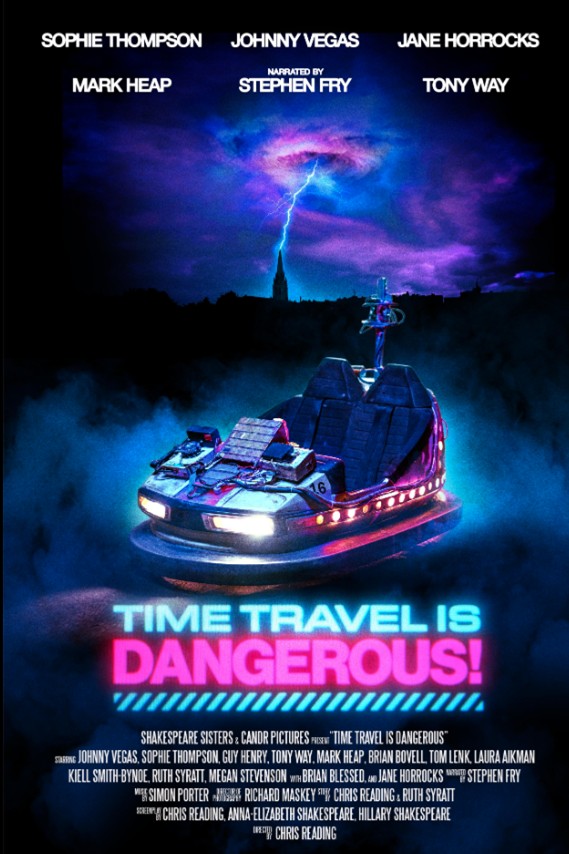Time Travel Is Dangerous
Time Travel Is Dangerous, 2025, 2 stars
Too much Time
Mockumentary is a charming, funny, undisciplined mess
 Exclusive to MeierMovies, April 30, 2025
Exclusive to MeierMovies, April 30, 2025
British writer-director Chris Reading is right: Time travel IS dangerous. Even travelling into the future at the rate of one second per second, like we’re doing now, can be perilous. Just ask your arthritis.
But that is, of course, not the type of journey Reading’s film depicts. As with most such films, Time Travel Is Dangerous involves going to the past, something that in real life would require traveling faster than the speed of light (impossible), a really cool machine (also impossible) or a wormhole (probably impossible). But narrative filmmaking is all about the impossible. So let’s suspend our disbelief and take a ride on Reading’s machine, if only for the time it takes to read this review.
Based on The Unreason, his short film from a few years ago, Reading’s feature version uses the same brilliant idea: Two antique-store owners stumble upon a discarded time machine and pilot it to centuries past to pilfer valuable items to sell in their shop. By escaping back to the future, the women can’t be caught. And they save money on present-day purchases. And their “vintage” items bring top dollar. It’s a win-win-win, in timely fashion.
“Since we found the time machine, we can pretty much get whatever we want,” the women explain. “You can’t run a vintage shop without a time machine these days.”
At less than five minutes, The Unreason barely had time to establish this amazing premise. Instead, it relied on quintessentially British humor, fast-paced editing, an endearing mockumentary format and surprisingly good performances by Ruth Syratt and Megan Stevenson, who, in a weirdly meta-theatrical way, play alternate versions of themselves. (The women really run the London bric-a-brac shop depicted in the film.)
At 99 minutes, Time Travel Is Dangerous has more than enough time to expand the story. In fact, it has too much time. And therein lies its downfall. The feature begins much like the short did, with Syratt and Stevenson reprising their roles. The feature even uses footage from the short. But we are soon introduced to new characters from a local science group, including the inventor of the machine, who never was able to make it work properly, realized its potential to destroy the space-time continuum and therefore threw it out with the rubbish. Assuming it would end up on the literal trash bin of history, he forgot about it. But upon learning of Ruth and Megan’s escapades, he and the rest of his amateur scientist friends blow a metaphorical fuse. Unfortunately, the machine itself has blown an actual fuse and stranded Megan in “the unreason,” a land between the present and the past.
But Megan is not the only thing lost in Reading’s exhaustingly overstuffed screenplay, which he wrote with Anna-Elizabeth and Hillary Shakespeare, who produced. Also mislaid is sustainable pacing, replaced by a frenetic mockumentary style, which, frustratingly, is often violated when the camera is in places it never could be in a documentary. (A non-realistic piece of art need not obey the rules of the real world, but it should obey its own rules.)
Forfeited, too, are truly smart ideas about time travel, replaced by clever gags and subplots involving the science club. But the most egregious misplacement occurs in the third act when the beautifully simple premise is hijacked by a completely different film. Instead of continuing the Christopher Guest-like vibe of the first two acts, the movie transitions to Terry Gilliam, and not a particularly good Gilliam at that. Points for imagination, but demerits for confusing excess.
The supporting cast (especially Johnny Vegas) is wonderful, and the production design and special effects contain kitschy charm. But giving high billing to Stephen Fry is gimmicky, as the legendary actor gets only a minute or two of off-screen narration.
“The most useful form of time travel would be to go back a year or two and rectify the mistakes we made.”
Inspired by this quote by British comedian and actor Matt Lucas, I would gladly travel at 700,000,000 miles an hour and show Reading this review before he made his film. He’d probably ignore me, which is understandable. But at least I’d have a mind-bending story to tell, one involving paradoxes and moral dilemmas. Sure, it wouldn’t be as funny as Reading’s, but it would get to the heart of the seduction of time travel, which Reading’s film, for all its allure, never quite reaches. Instead, his tale is stuck at the funny bone.
© 2025 MeierMovies, LLC
For more information on the film, visit IMDB and Wikipedia. The movie is currently playing cinemas in the United Kingdom and festivals in the United States. I saw the Florida premiere at St. Petersburg’s Sunscreen Film Festival on April 26. Reading and two of his fellow filmmakers attended the screening and participated in a Q&A session.